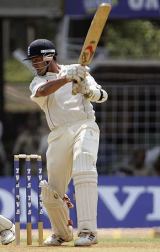Expectation, expectation, expectation
Tim de Lisle on how debutants have outmatched expectations in recent Tests ... and why we should savour the 400-run ODI and not complain about it being a batsman's game
Tim de Lisle
21-Mar-2006
|
|

|
There's a new book making a splash in which a Los Angeles columnist, Norah Vincent, disguises herself as a man, goes on dates with women, and writes about her experiences. She ends up surprising herself by feeling sympathy for poor old modern man. "The pressure to be a world-bestriding colossus is an immensely heavy burden to bear," she decides, before summing up her life as a man in three words, or rather one: "Expectation, expectation, expectation."
As yet, anthropologists have drawn few parallels between international cricket and the dating game in LA, but we surely have one here. The people who have been doing the most in recent Tests are those we least expect. The matchwinner in the Cape Town Test was Stuart Clark, the least fancied member of Australia's attack, sidling into the limelight at the age of 30. It's like a politician starting at 60.
In the India-England series, there have been a flurry of debuts, which are usually a sign of poor selection, but the debutants have been doing the business. Sreesanth and Munaf Patel have outswung Irfan Pathan, while Alistair Cook and Owais Shah have made the runs England expected from the man they replaced, Marcus Trescothick. There have also been flops - Ian Blackwell lived down to expectations, and the teenage legspinner Piyush Chawla was a boy among men. But mostly the understudies have shone like stars.
What has especially impressed the pundits is the fact that some of them had so little time to prepare. Cook stumbled into Test cricket as a jetlagged latecomer; when he fell ill, Shah ended up making his debut at an hour's notice after being one of cricket's coming men for 10 years. But as preparation time shrivels, so do expectations. Both were cast in the mould beloved of thriller writers: the man with nothing to lose.
Five of England's current batsmen had happy debuts, and four of them (Andrew Strauss and Ian Bell as well as Cook and Shah) were replacements. The only exception was Kevin Pietersen, who did enter the Test arena with high hopes on his shoulders - but then he is a raving extrovert. Throw him an expectation and he will see it as just another form of attention. Graeme Hick, by contrast, was an introvert lumbered with hopes so high they might even have been too much even for a Pietersen.
If we could translate expectations into stats, the man who would be top of the all-time averages is not Bradman (small country, slow times, faint spotlight), but Tendulkar (huge country, fast times, megawatt media). He has carried more hopes to the crease than any sportsman in history, and has tolerated them with amazing dignity. After 132 Tests - 80 more than Bradman - he has lived with the pressure so long that it must be part of his nervous system. Lately he has been in the most faltering form of his life, just as India has found another folk hero, in Mahendra Singh Dhoni. I wonder if that is a coincidence.
A chase to savour
Graeme Smith is a curious captain of an international team: he has plenty of leadership qualities, which don't seem to add up to being a good captain. He makes too many tactical blunders, often starting two days before a match by shooting his mouth off in scattergun fashion. And he was a hopeless choice to captain the World XI against Australia in October. But he deserves some sympathy now, because his team did something magical the other day and got little credit for it.
|
|

|
To have chased 335 in 50 overs would have been fantastic. To make 438 was superhuman. It has been pointed out that the pitch was flat, the boundaries short, the bowling thin, the rules loaded in favour of the batsmen. But to mount a chase like that, and sustain it right through the 50 overs, and pull it off with one ball and one wicket to spare, was still a phenomenal feat. We can't complain that 50-over cricket is so often forgotten a week later, and then complain some more when it delivers something unforgettable.
If the rules are on the side of the batsmen, it's because the game itself is intrinsically biased towards the bowlers. They get six chances an over; they have 10 people to help them; they can have a rest for an hour or two; they can make one mistake and it hardly matters. They set the tone: in tennis terms, it's always their serve. Physically, it's tougher being a bowler, but psychologically, it's tougher being a batsman, and as the players often tell us, top-class cricket is played largely in the mind.
Tim de Lisle is a former editor of Wisden and now edits www.timdelisle.com